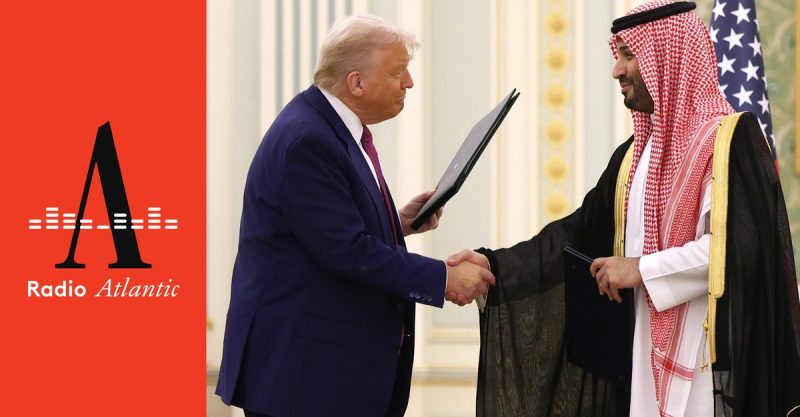
President Trump’s recent visit to Saudi Arabia, Qatar, and the UAE has been marked by a stark contrast to his predecessor’s reception. While Joe Biden received a notably cool welcome three years prior, Trump was greeted with lavish displays of affection and opulent gifts, including a luxury jet from Qatar. This apparent warmth stems from Trump’s transactional approach, a style that resonates deeply with Gulf leaders. He understands their language of power and patronage, and they, in turn, appreciate his direct, unfiltered style.
This episode of Radio Atlantic delves into the details of this new era of chumminess, featuring insights from Hussein Ibish, a senior resident scholar at the Arab Gulf States Institute. Ibish highlights the mutually beneficial nature of the relationship: Gulf states receive protection, while Trump secures substantial financial gains for both himself and the country. Massive weapons deals and investments in Trump-branded properties across the region illustrate this transactional dynamic. The luxury jet serves as a potent symbol of this exchange, blurring the lines between personal enrichment and official state business.
Ibish emphasizes that Trump’s approach resonates with Gulf leaders’ existing patron-client systems. He operates without the constraints of traditional American political norms, allowing for an easy understanding and mutual appreciation. However, this transactional approach has significant consequences. Trump’s complete silence on Saudi Arabia’s human rights violations contrasts sharply with the rhetoric of previous administrations. While Ibish notes improvements in the human rights situation under MBS, the legacy of past abuses, including the murder of Jamal Khashoggi, cannot be ignored.
The podcast then shifts focus to the broader implications of this relationship for regional conflicts. Trump’s recent deals – a ceasefire with the Houthis in Yemen, the release of a US hostage in Gaza, and the lifting of sanctions on Syria – point to a strategy of reducing American entanglement in the region. This is partially driven by Gulf nations’ desire for greater autonomy in managing regional affairs, particularly in Syria, where they seek to invest in reconstruction without US interference. The potential for a renewed nuclear deal with Iran, a goal that aligns with Gulf states’ interest in regional stability, is also discussed.
However, the most significant point of contention remains Israel. Netanyahu’s threats to escalate the situation in Gaza create a complex challenge for Trump. While the strengthened ties with Gulf nations could provide leverage to restrain Israel, the deeply ingrained relationship between the US and Israel, fueled by powerful political lobbies, presents a significant obstacle. The podcast concludes with a somber reflection on the dire humanitarian situation in Gaza, the potential for further Israeli military action, and the ethical implications of such a devastating conflict.










